This past weekend, I had the privilege of convening an Election Postmortem hosted by the University of Notre Dame’s Center for Philosophy of Religion. The CPR invited me to spend this year with them, and one of the perks (in addition to weekly pub nights) has been working together with directors Mike Rea and Laura Callahan to organize this event. We gathered an impressive group of scholars, faith leaders, activists, and practitioners, but the audience was equally impressive, including a number of additional scholars, faith leaders, journalists, heads of organizations, and engaged citizens from the United States and Canada.
One of the journalists in attendance was Rick Pidcock of Baptist News Global.
If you’re not already following Rick, you should be. He’s one of the journalists most attuned to dynamics inside right-wing Christian spaces. His work is informed both by personal experience within conservative white evangelicalism and by diligent reporting. (See, for example, his recent critique of The Gospel Coalition’s critique of Wicked, or his article on Hegseth fitting the TheoBro pattern of abuse culture. Better yet, follow him here on Substack.)
Scroll down to find videos of the first two sessions, but read on for a taste of Rick’s insightful coverage of the event here. I love how he provides more than just a play-by-play but captures the mood of the event itself. Here’s Rick:
As I walked through the snow toward McKenna Hall at Notre Dame University, I imagined the next 12 hours would include hard truths and valuable insights from professors and pundits about the reelection of Donald Trump and the Republican takeover of Congress.
The 2024 Election Postmortem was hosted by Notre Dame’s Center for Philosophy of Religion. It sought to answer three main questions: What happened, what to watch for in the days ahead, as well as planning, partnerships and practical steps for the next four years.
Notre Dame’s Center for Philosophy of Religion focuses on bringing philosophy and theology into a conversation to provide insights for every day, normal people.
“If there’s any issue where we might expect Notre Dame would have a voice that we hope the rest of the country and the world would listen to, it’s on the question of faith and religion and how it relates to democracy,” said David Campbell, professor of American Democracy and director of the Notre Dame Democracy Initiative.
And to be sure, the next 12 hours did not disappoint. The event, which was envisioned and organized by Kristin Du Mez, brought together a unique blend of professionals exploring three well-balanced themes that combined honesty and hope. But perhaps the most meaningful expression of Notre Dame’s voice at this event was its hospitality.
Reaching out
One of my earliest memories in life was watching a Notre Dame football game at my grandparents’ house in 1987. The reason I remember this game so clearly is that I yelled, “I hate Catholics!” And suddenly, my dad was informing me that my aunt, who was in the room, was a Catholic.
Of course, I had no idea what Catholics were. But my independent Baptist parents were recent graduates of Bob Jones University, which is a fundamentalist evangelical university whose founder called the pope the Antichrist. So I imagine my hateful outburst toward Catholics was learned at home.
Up until 2015, I was a fully committed evangelical Christian nationalist who never would have imagined sitting under the teaching of a Catholic. So in a sense, this conference felt like a group of people having a conversation about how to reach out to my past self.
My journey of walking away from Christian nationalism and opening toward my neighbor began with a spiritually healing journey of self-awareness that fostered a love of neighbor as self. The first seeds of this journey were planted when I was required to read a book called Reaching Out, by Henri Nouwen, who taught at Notre Dame in the 1960s. And for me, experiencing the 2024 Election Postmortem felt like the embodiment of Nouwen’s reflections on hospitality.
Hospitality in an academic setting
In evangelical spaces of gender binaries, hospitality is typically considered the work of women, while men provide the entirely different discipline of teaching. But in Nouwen’s theology, hospitality is about more than setting out donuts and coffee. It is about postures within, toward and among one another. And for Nouwen, hospitality is crucial for academics.
Nouwen defined hospitality as “the creation of a free and friendly space where we can reach out to strangers and invite them to become our friends.” As I told Kristin Du Mez after the event, it felt like being with old friends despite so many of us never having met.
Much of this was due to who Du Mez and Notre Dame brought together for the event. As Nouwen writes, the affirmation of one another provided in hospitality “often means just bringing the right persons together or setting apart time and place where more thinking can be done.” That’s exactly what the 2024 Election Postmortem provided.
I mentioned to Robert P. Jones between sessions that it’s interesting how many of these events are being hosted by academics, and yet they’re connecting with people who aren’t academics. Jones said given what the academics are noticing in their research, they’re realizing conversations need to be had and these events are how they know to have them.
But despite having the knowledge about data the rest of us don’t have, the academics Du Mez has been gathering aren’t driven by hierarchy, but rather by hospitality. As Nouwen suggests, “Teachers who can detach themselves from their need to impress and control, and who can allow themselves to become receptive for the news that their students carry with them, will find that it is in receptivity that gifts become visible.” He suggests a teacher can be “a receiver who can help the students to distinguish carefully between the wheat and the weeds in their own lives and to show the beauty of the gifts they are carrying with them.”
At the 2024 Election Postmortem, the professors and pundits on the three panels not only shared their insights but invited the insights of the guests. For one thing, even something as subtle as referring to us as “guests” was a way of fostering a feeling of having a table conversation. Also, our questions and insights during the discussions were clearly valued, as if we were offering a gift to the hosts as well. And as Nouwen points out, when that happens, “the distinction between host and guest proves to be artificial and evaporates in the recognition of the new found unity.”
A unity of diverse backgrounds and perspectives
One of the most beautiful moments of the conference for me was a conversation I had around a table with a half dozen of the panelists and guests. Three of the women had no church background, one of the men was a pastor, another was a Notre Dame professor, and two of us came from conservative evangelical backgrounds.
We talked about how our different families approached the holidays during our childhoods and how our current experience of Christmas is affected by the wonders and wounds of our childhoods. We shared stories of hell houses, altar calls, yoga and carefully designed Bronze Age figurines gifted by a hippy mom. We laughed and lamented through the complexity of it all.
None of us tried to convert the other to our theology or politics. We were simply present together in the stillness of stories. And although most of us around the table wouldn’t be interested in attending the institutional church the professor or the pastor led, we were together in what Nouwen would call a “friendly emptiness where strangers can enter and discover themselves as created free; free to sing their own songs, speak their own languages, dance their own dances; free also to leave and follow their own vocations.”
Why? Because, “Hospitality is not a subtle invitation to adopt the lifestyle of the host, but the gift of a chance for the guest to find his own.”
In this space, around this table, I never would imagine yelling out like I did as a 5-year-old fundamentalist, “I hate Catholics!” So why does white evangelicalism, as evidenced in the 2024 election, produce the fruit of hierarchy rather than hospitality?
From here, Pidcock goes on to describe contributions from Robert Jones, Rachel Brown, Jim Wallis, Elizabeth Neumann, Chris Parker, Katherine Stewart, Matthew Taylor, Amanda Tyler, and Anne Nelson. You can read more here.
Stephen Waldron, a research fellow with me at the Center for Philosophy of Religion, shared his own insightful reflections on the Election Postmortem here on Substack.
Waldron focused on seven key takeaways:
Some things have not changed at all: As far as religious voting patterns, some things have been remarkably consistent. Religious/demographic groups like “Catholic voters,” “Black Protestants,” and “white evangelicals” have been voting in very predictable patterns for about 5 decades. More broadly, most voters, whether or not they have any political ideology, essentially vote based on whether a candidate has an “R” or a “D” next to their name.
There is still an underlying issue about whether a two-party, “first-past-the-post,” presidential system can preserve representative democracy in the long run. Other approaches like proportional representation in a parliament with multiple viable parties would probably be better at maintaining “free and fair elections.” We can’t do anything about that right now, though.
The immediate challenge is prevent “democratic backsliding.” In contexts where newly elected leaders and ruling parties have wanted to dismantle democratic institutions, rapid and sustained resistance by a broad coalition has been the only thing that has prevented that. A key example is in the resistance to election tampering and political interference with the judicial system in Poland. From 2015 to 2023, the ruling Law and Justice Party tried to roll back representative institutions to create a situation of dominance for their own party, regardless of popular opposition. Last year, a broad coalition of moderates, liberals, and conservatives successfully won enough votes to preserve democratic institutions. In other cases, such as in Turkey or Russia, autocratic parties and leaders rule over previously democratic societies and have severely restricted liberties and persecuted minority groups. They could do that because no successful opposition coalition kept them from dismantling representative institutions and freedoms for the press and civil society. In the US today, we are in an uncertain moment when people who have explicitly tried to dismantle representative institutions (for instance, by pressuring Georgia’s secretary of state to change election results or by threatening election officials and volunteers in places like Arizona or by implementing extreme gerrymandering in Wisconsin and North Carolina) now have national-level opportunities to change key institutions. It is not clear whether there is a broad enough coalition to prevent a slide into long-term autocratic one-party rule under “strongman” leadership.
Longer-term, we have a serious problem with social disconnection. The building blocks of a democratic society are interpersonal connections that have been fraying in the US over the last few decades. The collapse or decline of social gatherings (like Robert Putnam’s bowling leagues and Elks Clubs) and, more recently, of every major Christian church denomination (even those that had never declined before) is a crisis for public life. Many individuals are incredibly isolated and some (mostly young men) will be increasingly vulnerable to the kinds of radicalization that lead to acts of political violence. More broadly, an increasing percentage of the population feels no real investment in public life. If they vote, they will be open to the idea of destroying society, including its democratic institutions.
The biggest and most concerning divide in our society is the educational attainment gap. Cultural, political, and religious connections between the 35% of adults in the US with a 4-year college degree and the 65% without a 4-year degree have been declining. For all the talk of “partisan echo chambers,” the deeper underlying issue is that those two educational groups often live in separate realities. Even within each major political party, this gap is wide and seems to be growing. There are many possible ways to deal with this, and we have been choosing the worst ones. Denigrating education and expertise will lead in horrible directions for everyone; we have seen that happen in fascist, Stalinist, and Maoist societies. Trying to impose political discourse that only makes sense to people who have read Foucault will also lead nowhere good. Ignoring the fact that 21% of adults in the US are “functionally illiterate” and 54% read below a 6th-grade level will not go well either. We cannot have a technologically-advanced democratic society that engages in real public dialogue without widespread literacy. The “pivot to video” in our media consumption has not helped with this; nor has our neglect of phonics instruction. In the short-term, people who advocate for freedom and equality need to learn to communicate at a level that reaches across the educational attainment gap. In the longer-term, we need to massively expand access to education and culture. It will not work to have a society in which 35% of the public thinks about things in terms like “social systems” or “climate change” and a large portion of 65% applauds the nomination of a professional wrestling executive as the top education official or an anti-vaxxer as the top health official. We should neither be snobbish and condescending to people with less education nor engage in a “soft bigotry of low expectations” that says “well, that’s just how ‘working class culture’ is.” Education and expertise about things beyond practical skills are real and important for public life. Consequently, we need to do whatever we can drastically expand access to “liberal education” (meaning, education in the sciences, humanities, and arts) for adults of all ages.
Our public life is also shaped by long-standing forms of bigotry, including xenophobia, racism, and sexism. In the short-term, we need to defend people who are under attack, such as our Haitian neighbors who were targeted by national politicians using racist lies that originated with members of the Neo-Nazi group Blood Tribe. In the longer-term, we need to face the fact that these problems exist around the world. From Brazil to South Africa to Bangladesh, unprincipled leaders use latent bigotry to attack unpopular groups of refugees and immigrants. Patriarchy is a similarly global issue. As Jesus might have said, these demons are not expelled except by prayer and fasting. It’s going to be a long and difficult struggle toward freedom and equality.
In concluding, I have to say that I think that most theological responses to public life in the US have failed. They have real strengths, but they’re not meeting the moment we are in. One of the most prominent responses has been an idea from Stanley Hauerwas and others that the church should have its own internal “politics” and model for the rest of world how to live and die well, rather than trying to gain political power. That’s a nice idea, but, among other things, I’m not sure that the leaders and members of most churches in the US have been particularly virtuous in a way that even should inspire others to imitate how they live. There have also been a variety of liberation theologies focusing on the social and material conditions of particular groups of oppressed people, such as those who are poor, Black, or disabled. These theologies have impacted the views of a lot of people, but, as theologian and Senator Raphael Warnock has pointed out, there are real gaps between most of these academic theologies and where most church people are at in their own theologies—let alone what can be implemented in national politics. I don’t mean that theologies of liberation are unimportant; they’re just not enough to deal with our current challenges. If cannot figure out broadly inclusive, truthful, attractive, and accessible ways to talk about both what is most true and sacred and how to live together as a society, we won’t have a democratic society anymore. We’re not there right now.
Special thanks to Rick and to Stephen for their wonderful reflections. If you weren’t able to join us, view the first two sessions here:
The first features Notre Dame’s David Campbell and Karrie Koesel, Chris Parker of UCSB, Robert Jones of PRRI, and journalist Katherine Stewart (moderated by Mike Rea) and covers what happened in the election and its runup.
The second session (love the thumbnail here) focuses on what to watch for in the days ahead and features Rachel Brown of Over Zero, Lilliana Mason of Johns Hopkins, and Elizabeth Neumann, Matthew Taylor (Institute for Islam, Christian, Jewish Studies, and myself, and was moderated by Laura Callahan.




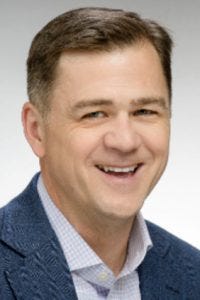
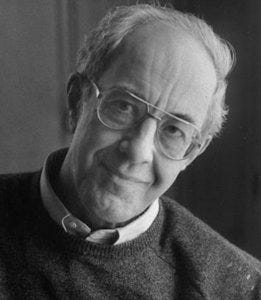
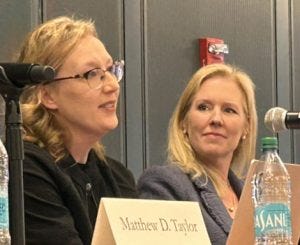
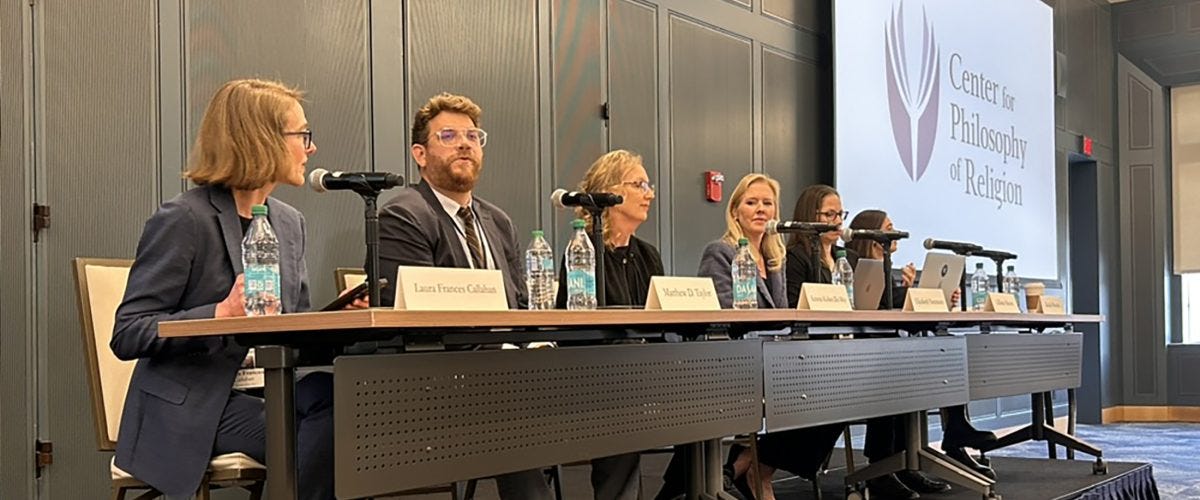
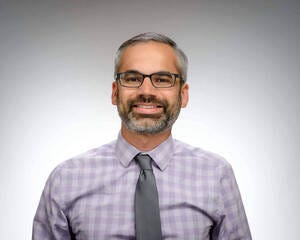
Goodness! Stephen's bald conclusion should leave us all reeling! Thanks for sharing.
Congratulations, I look forward to the video.